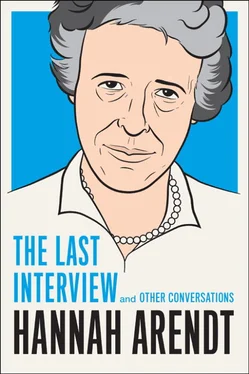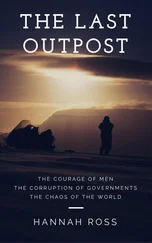War has, so to speak, become a luxury which only the small nations can still afford, and they only so long as they are not drawn into the spheres of influence of the great powers and do not possess nuclear weapons themselves. The great powers interfere in these wars in part because they are obliged to defend their clients and in part because this has become an important piece of the strategy of mutual deterrence on which the peace of the world today rests.
Between sovereign states there can be no last resort except war; if war no longer serves that purpose, that fact alone proves that we must have a new concept of the state. This new concept of the state, to be sure, will not result from the founding of a new international court that would function better than the one at The Hague, or a new League of Nations, since the same conflicts between sovereign or ostensibly sovereign governments can only be played out there all over again—on the level of discourse, to be sure, which is more important than is usually thought.
The mere rudiments I see for a new state concept can be found in the federal system, whose advantage it is that power moves neither from above nor from below, but is horizontally directed so that the federated units mutually check and control their powers. For the real difficulty in speculating on these matters is that the final resort should not be super national but international. A supernational authority would either be ineffective or be monopolized by the nation that happens to be the strongest, and so would lead to world government, which could easily become the most frightful tyranny conceivable, since from its global police force there would be no escape—until it finally fell apart.
Where do we find models that could help us in construing, at least theoretically, an inter national authority as the highest control agency? This sounds like a paradox, since what is highest cannot well be in between, but it is nevertheless the real question. When I said that none of the revolutions, each of which overthrew one form of government and replaced it with another, had been able to shake the state concept and its sovereignty, I had in mind something that I tried to elaborate a bit in my book On Revolution. [c] On Revolution (New York: Viking Press, 1963).
Since the revolutions of the eighteenth century, every large upheaval has actually developed the rudiments of an entirely new form of government, which emerged independent of all preceding revolutionary theories, directly out of the course of the revolution itself, that is, out of the experiences of action and out of the resulting will of the actors to participate in the further development of public affairs.
This new form of government is the council system, which, as we know, has perished every time and everywhere, destroyed either directly by the bureaucracy of the nation-states or by the party machines. Whether this system is a pure utopia—in any case it would be a people’s utopia, not the utopia of theoreticians and ideologies—I cannot say. It seems to me, however, the single alternative that has ever appeared in history, and has reappeared time and again. Spontaneous organization of council systems occurred in all revolutions, in the French Revolution, with Jefferson in the American Revolution, in the Parisian commune, in the Russian revolutions, in the wake of the revolutions in Germany and Austria at the end of World War I, finally in the Hungarian Revolution. What is more, they never came into being as a result of a conscious revolutionary tradition or theory, but entirely spontaneously, each time as though there had never been anything of the sort before. Hence the council system seems to correspond to and to spring from the very experience of political action.
In this direction, I think, there must be something to be found, a completely different principle of organization, which begins from below, continues upward, and finally leads to a parliament. But we can’t talk about that now. And it is not necessary, since important studies on this subject have been published in recent years in France and Germany, and anyone seriously interested can inform himself.
To prevent a misunderstanding that might easily occur today, I must say that the communes of hippies and dropouts have nothing to do with this. On the contrary, a renunciation of the whole of public life, of politics in general, is at their foundation; they are refuges for people who have suffered political shipwreck—and as such they are completely justified on personal grounds. I find the forms of these communes very often grotesque—in Germany as well as in America—but I understand them and have nothing against them. Politically they are meaningless. The councils desire the exact opposite, even if they begin very small—as neighborhood councils, professional councils, councils within factories, apartment houses, and so on. There are, indeed, councils of the most various kinds, by no means only workers’ councils; workers’ councils are a special case in this field.
The councils say: We want to participate, we want to debate, we want to make our voices heard in public, and we want to have a possibility to determine the political course of our country. Since the country is too big for all of us to come together and determine our fate, we need a number of public spaces within it. The booth in which we deposit our ballots is unquestionably too small, for this booth has room for only one. The parties are completely unsuitable; there we are, most of us, nothing but the manipulated electorate. But if only ten of us are sitting around a table, each expressing his opinion, each hearing the opinions of others, then a rational formation of opinion can take place through the exchange of opinions. There, too, it will become clear which one of us is best suited to present our view before the next higher council, where in turn our view will be clarified through the influence of other views, revised, or proved wrong.
By no means does every resident of a country need to be a member of such councils. Not everyone wants to or has to concern himself with public affairs. In this fashion a self-selective process is possible that would draw together a true political elite in a country. Anyone who is not interested in public affairs will simply have to be satisfied with their being decided without him. But each person must be given the opportunity.
In this direction I see the possibility of forming a new concept of the state. A council-state of this sort, to which the principle of sovereignty would be wholly alien, would be admirably suited to federations of the most various kinds, especially because in it power would be constituted horizontally and not vertically. But if you ask me now what prospect it has of being realized, then I must say to you: Very slight, if at all. And yet perhaps, after all—in the wake of the next revolution.
THE LAST INTERVIEW
INTERVIEW BY ROGER ERRERA
UN CERTAIN REGARD , ORTF TV, FRANCE
OCTOBER 1973
TRANSLATED BY ANDREW BROWN
In October 1973, Hannah Arendt was interviewed by Roger Errera for the Office de Radiodiffusion-Télévision Française (ORTF). Recorded over several days, the interviews were later worked into a fifty-minute television feature directed by Jean-Claude Lubtchansky for the series Un certain regard , and first broadcast on July 6, 1974.
For the film, Arendt’s answers were translated into French and dubbed, with Arendt’s original voice behind it. By using this soundtrack and various transcripts and translations of the interviews, Arendt scholar Ursula Ludz reconstructed Arendt’s original answers and assembled an authoritative manuscript of the interview as it was televised. Stars indicate places where there was a cut in the film and where different sessions of the interviews have been pieced together.
Читать дальше












